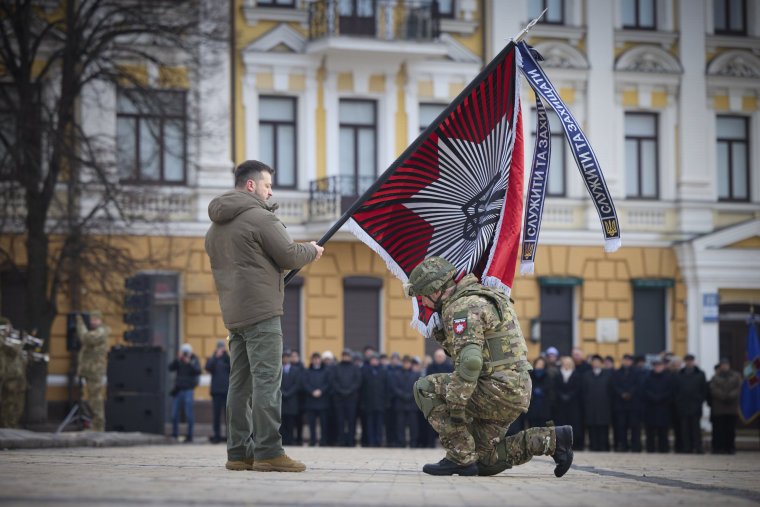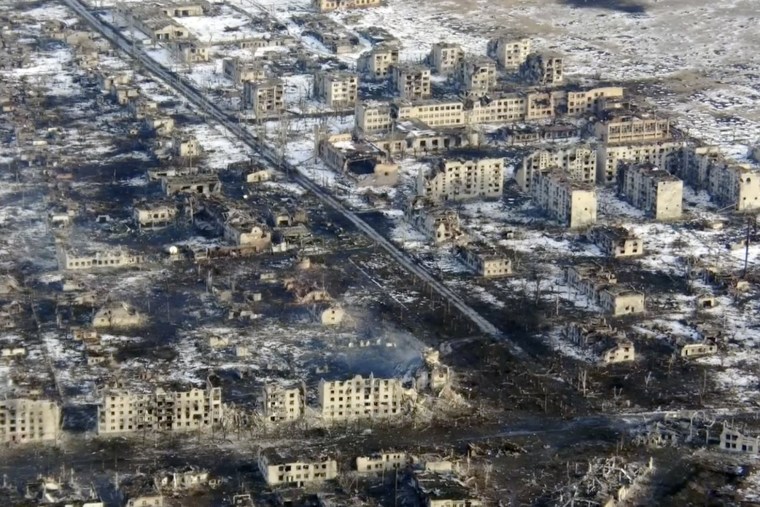Russia’s invasion of Ukraine reached its first anniversary Friday as the United States announced new military support for Kyiv and sanctions against the Kremlin, while President Volodymyr Zelenskyy praised his “invincible” country and vowed to push for victory.
The world marked one year since Russian tanks rolled into Ukraine — starting a deadly new phase of a war that had been raging since 2014 — with somber ceremonies and pledges of unbowed support from the Western alliance that has aided Kyiv's defiant defense.
China used the anniversary to unveil a peace plan that appeared at odds with the renewed intensity on the battlefield — a move likely to do little to ease concerns that Beijing's balancing act on the conflict has shifted toward Russian President Vladimir Putin, who demonstrated his commitment to a lasting fight with a week of patriotic events.

Western support and sanctions
The Biden administration said early Friday it would send Ukraine a range of high-tech military equipment, ammunition and financial aid, in a new $2 billion support package on the anniversary of what it called Russia’s “brutal and unprovoked” full-scale invasion.
The White House said in a statement that it was also joining with partners in the Group of Seven countries to impose new financial penalties designed to stop the funding of Moscow's war machine.
Those measures will include sanctions on 200 people and companies, restricting exports to Russia and increasing tariffs on products from the country.
"From Kherson to Kharkiv — Ukrainian fighters have reclaimed their land," Biden said in a tweet Friday. "And in more than half of the territory Russia held last year, the Ukrainian flag proudly waves once more."
The president's surprise visit to Kyiv and speech in Warsaw this week sought to allay fears that Western support might fade as the war drags on.
Zelenskyy, who has won acclaim across the world for leading his country's stand in Kyiv, said Ukraine had "remained invincible" and pledged to push for victory in the second year of the war.
Feb. 24, 2022, was “the longest day of our lives" he said in a video address. "The hardest day of our modern history. We woke up early and haven’t fallen asleep since.”
The new tranche of equipment for Kyiv includes drones, high-mobility artillery rocket systems known as HIMARS, a “large amount” of ammunition for artillery systems, mine-clearing devices and communications gear.
Poland said that the first of its German-made Leopard-2 tanks would arrive in Ukraine on Friday, the first of dozens promised by Western nations.
Tributes to Ukraine's resolve poured in Friday from Berlin to Brussels and Buckingham Palace, with King Charles III of Britain joining the chorus of voices saluting Ukraine’s "truly remarkable courage and resilience in the face of such human tragedy.” Ukraine’s flag was also displayed across Western nations on Friday, with the Eiffel Tower, the Brandenburg Gate, the Empire State Building and the Sydney Opera House all awash in yellow and blue.
In a sign of Russia's growing isolation on the world stage, 141 members of the United Nationals General Assembly voted Thursday for a resolution calling on Moscow to end the war and withdraw its forces from Ukraine. Syria and Belarus were among the seven states to vote against the motion; there were 32 abstentions.
Speaking before the U.N. Security Council on Friday, U.S. Secretary of State Antony Blinken said the “spirit of the Ukrainians remains unbroken” and that “if anything, it’s stronger than ever.”
“No country has endured greater hardship from Russia’s war than Ukraine," Blinken said. "But almost every country has felt the pain, and yet nations around the world continue to stand with Ukraine because we all recognize that if we abandon Ukraine, we abandon the U.N. Charter itself and the principles and rules that make all countries safer and more secure.”
Blinken said that Security Council members “should not be fooled by calls for a temporary or unconditional ceasefire” because he said Russia would “use any pause in fighting to consolidate control over the territories illegally seized” and replenish forces for further attacks.
China's deputy permanent representative to the U.N., Dai Bing, said that long-term diplomatic negotiations is "the only right way to solve the Ukraine crisis."
"Conflicts have no winners,” he said. “The international community should promote peace and talks with the highest sense of urgency and work to create enabling factors and platforms for the resumption of negotiation."
He also said that "some relevant parties have been resorting to unilateral sanctions and maximum pressure," which he said can't solve any issue and only undermines the stability of the global supply chain. "We hope that the relevant parties take responsible actions and stop abusing unilateral sanctions," he said.
Ukraine Foreign Minister Dmytro Kuleba said outside the U.N. Security Council chamber in New York on Friday that China's foreign minster, Wang Yi, had briefed him on key elements of the peace plan a couple weeks ago, and he saw the final version of the plan on Thursday night.
Kuleba called it “an interesting document” that they would “have to examine from A to Zed.”
“There are some elements that we agree with. There’s at least one element that we do not agree with, on relaxing of sanctions. We believe that sanctions are important,” he said near the end of a morning session in which most Security Council members gave searing statements about Russia’s invasion of Ukraine.
Russian threats and China's peace plan
Russia's isolation has left it increasingly reliant on China, which marked the anniversary by setting out its own vision for peace in Ukraine, restating a call for a cease-fire and an end to unilateral sanctions — days after the U.S. said Beijing may be set to provide Moscow with lethal military assistance.
“Conflict and war benefit no one. All parties must stay rational and exercise restraint, avoid fanning the flames and aggravating tensions, and prevent the crisis from deteriorating further or even spiraling out of control,” Beijing’s foreign ministry said in a statement laying out its 12-part plan.
NATO Secretary General Jens Stoltenberg accused China of not having “much credibility” on the subject at a news conference on Friday.
While China says it is neutral in the conflict, it also has what it calls a “no limits” relationship with Moscow. Beijing this week hit back at Washington’s accusations about supporting Russia, telling the U.S. to stay out of its relationship with the Kremlin.
The conflict persists with undimmed intensity, with fierce fighting in the eastern Donbas region following the start of a renewed Russian offensive drive this month.
Ukrainian officials warned the anniversary may see a spike in missile attacks, with schools urged to close and thousands across the country attending vigils and commemorations for those killed in the war despite ongoing warnings for their safety.
The milestone has not brought any significant Russian advances on the battlefield, though.
The goal of the Russian military was now to degrade Ukraine's army rather than win swaths of new territory, the British Ministry of Defense said in its daily intelligence briefing Friday.
“The Russian leadership is likely pursuing a long-term operation where they bank that Russia’s advantages in population and resources will eventually exhaust Ukraine,” the ministry said.
The Kremlin honored the anniversary with an uncompromising set of appearances from Putin this week, in which he vowed to strengthen the country’s nuclear forces after suspending its role in the New START nuclear arms treaty with the U.S., and addressed a patriotic event in Moscow to honor Russia’s armed forces.
Former Russian President Dmitry Medvedev, who renewed the START treaty in 2009 but now represents pro-war hawks, said Friday that the only way to ensure a lasting peace was to push back the borders of hostile states as far as possible, even if that included NATO member Poland.

Fears of broader escalation have waxed and waned throughout the year of conflict, though the past week has brought renewed concerns about neighboring countries being drawing in.
The Institute for the Study of War said in an analysis briefing Thursday, citing Ukrainian intelligence, that Russian forces were preparing a “false flag” operation — an attack disguised to look like it was carried out by the opposing side — in the northern Chernihiv region, which borders Belarus and Russia, and in the occupied region of Transnistria in Moldova.
Ukrainian officials believe, the ISW report said, that unmarked Russian vehicles and soldiers wearing uniforms similar to those worn by Ukrainian forces had already been spotted near to the border with Belarus.
“The purpose of these false flag operations would be to accuse Ukrainian forces of violating the territorial integrity of an unspecified country, very likely referring to Belarus,” the ISW said, adding that Putin suffers from “confirmation bias” in his belief that Russia’s endurance in the war outlast the West’s will to support Ukraine.
